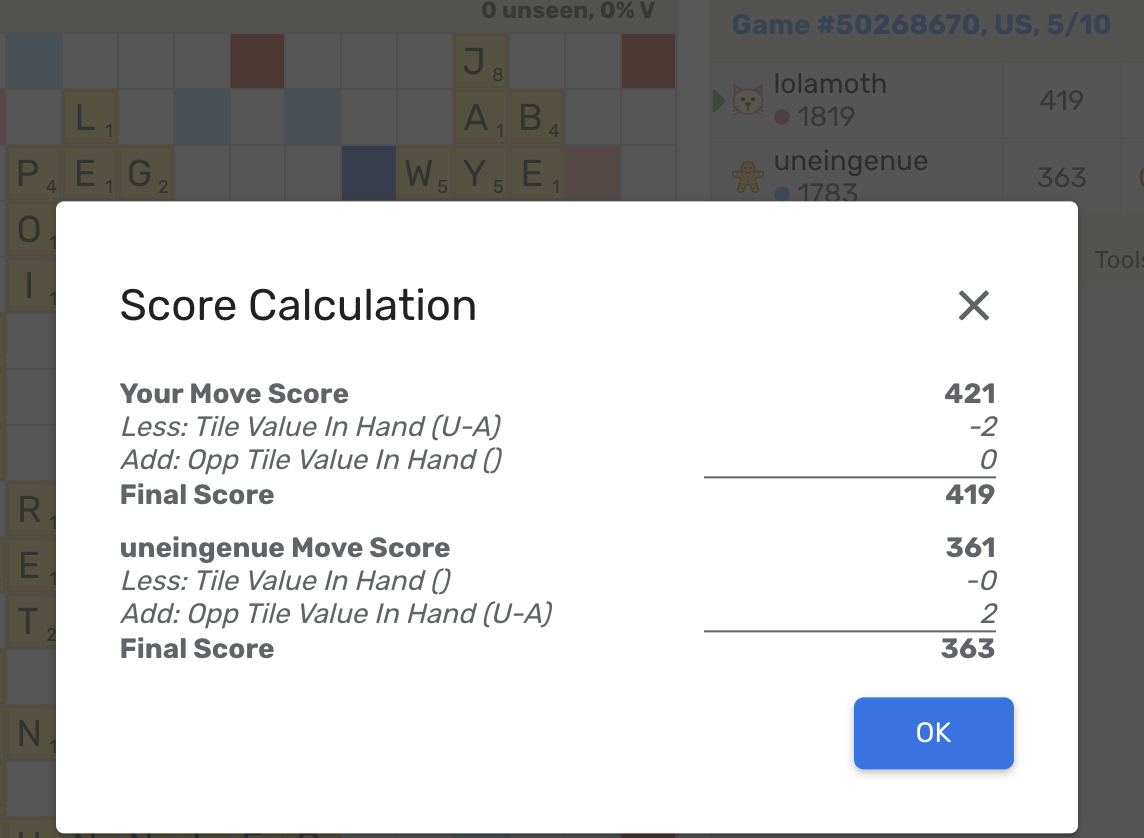The man behind the curtain
-
My understanding of the rules is that the value of the remaining tiles on the losing side is subtracted from their Move Score and added to the Move Score of the winner (the player who emptied their rack on their last play).
But look here. The value of the Opp/loser's remaining tiles (2) was subtracted from the winner's total. I had the higher score and had no remaining tiles. Shouldn't it be the other way around?
The screenshot is from a game (#50268670 US) I won yesterday. I've never seen this calculation popup box before, so I screenshotted it.

-
My understanding of the rules is that the value of the remaining tiles on the losing side is subtracted from their Move Score and added to the Move Score of the winner (the player who emptied their rack on their last play).
But look here. The value of the Opp/loser's remaining tiles (2) was subtracted from the winner's total. I had the higher score and had no remaining tiles. Shouldn't it be the other way around?
The screenshot is from a game (#50268670 US) I won yesterday. I've never seen this calculation popup box before, so I screenshotted it.

-
@lolamoth I thought remaining tiles were calculated against the player who has them and for the player who has none left regardless of who is the winner and I think thats what this calculation shows. But I’m sure someone will correct me if I’m wrong.
@debroth Yes, if you play all your tiles on your last move, you get a bonus of the points in your opponent's rack, and the opponent gets a penalty of those points. If the game ends with tiles left over for both players, then both players get the penalty, and neither gets a bonus.
-
@lolamoth I thought remaining tiles were calculated against the player who has them and for the player who has none left regardless of who is the winner and I think thats what this calculation shows. But I’m sure someone will correct me if I’m wrong.
-
@debroth Are you kidding? In here, someone will correct you even if you're right! :slightly_smiling_face:
@mapmakere ha ha, that's kind of why I rarely post on here ;)
-
@debroth Yes, if you play all your tiles on your last move, you get a bonus of the points in your opponent's rack, and the opponent gets a penalty of those points. If the game ends with tiles left over for both players, then both players get the penalty, and neither gets a bonus.
@dan-chall So why did I, as the winner, get the penalty?
-
@dan-chall So why did I, as the winner, get the penalty?
@lolamoth The penalty is charged to the player with tiles left over when the game ends. It never depends on who wins or loses. The bonus goes to the player who plays their final tile, win or lose. I've played many games where the winner gets the penalty, and I've even played some where the bonus and penalty swings the victory towards the player who was behind but plays their final tile and gets the extra points because opponent, ahead at the last move, was stuck with lots of points in their rack.
-
When the game is over, the player with remaining tiles is assessed the penalty.
-
My understanding of the rules is that the value of the remaining tiles on the losing side is subtracted from their Move Score and added to the Move Score of the winner (the player who emptied their rack on their last play).
But look here. The value of the Opp/loser's remaining tiles (2) was subtracted from the winner's total. I had the higher score and had no remaining tiles. Shouldn't it be the other way around?
The screenshot is from a game (#50268670 US) I won yesterday. I've never seen this calculation popup box before, so I screenshotted it.

@lolamoth Your initial assumption is incorrect. I rewrote it: The rule is that the value of the remaining tiles at the end is subtracted from their Move Score and added to the Move Score of the player who emptied their rack on the last play regardless of who wins.
And part of the strategy at the end can involve what tiles you'll be left with if the other plays out first.
